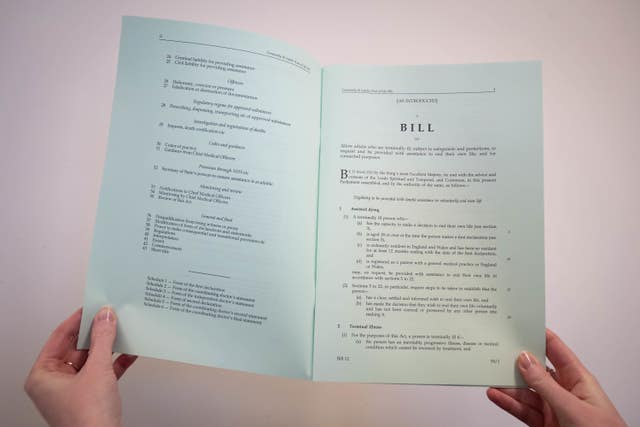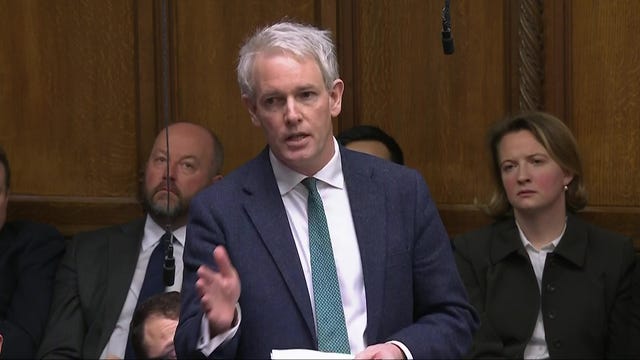The first assisted dying debate in the House of Commons in almost a decade is “long overdue”, the MP behind the Bill has said as she appealed for respect and compassion in Parliament on the controversial issue.
Kim Leadbeater opened debate on her Terminally Ill Adults (End of Life) Bill on Friday – the first time the issue has been debated in the Commons since 2015.
Five hours have been set aside for MPs to air their views on the Bill, and a vote must be called before 2.30pm otherwise the Bill is highly unlikely to make any further progress through Parliament.
In a sign of the level of feeling on the issue, Commons Speaker Sir Lindsay Hoyle said more than 160 MPs are bidding to speak on it.
Opening the debate, Ms Leadbeater told MPs: “I know that this is not easy. It certainly hasn’t been easy for me. But if any of us wanted an easy life, I’m afraid we are in the wrong place.
“It is our job to address complex issues and make difficult decisions. And I know for many people this is a very difficult decision.
“But our job is also to address the issues that matter to people, and after nearly a decade since this subject was debated on the floor of the House, many would say this debate is long overdue.”
She said the conversation on such a divisive issue has been respectful and compassionate to date, adding: “I know I can be confident that that same tone of respect and compassion will be adopted by colleagues today – whatever views they may hold.”
Encouraging or assisting suicide is against the law in England and Wales, with a maximum jail sentence of 14 years.

Ms Leadbeater has said the current law is not fit for purpose and her proposals would allow terminally ill adults in the two nations with less than six months to live to end their lives, subject to the approval of two doctors and a High Court judge.
She said: “Existing guidance does not stop people from being investigated by the police, adding fear, guilt and further trauma to grieving families.
“The law is not clear and it does not protect individuals, families or medical professionals, and this drives people to very desperate measures.”
Conservative MP Danny Kruger, lead MP for opponents of the Bill, branded it “too big” and “too flawed” for meaningful changes to be made to it during the parliamentary process.
He told MPs: “This Bill is simply too big for the time that it has been given. I implore members not to hide behind the fiction that it can be amended substantially in committee and in the remaining stages.”

Mr Kruger is at odds with his mother, Great British Bake Off judge Dame Prue Leith, on the issue of assisted dying.
Dame Prue has been vocal in her support for a new law, appealing earlier this year for “less pearl-clutching” about whether there should be reform and instead more “serious, constructive debate about how to craft the best possible law for our dying people”.
Mr Kruger said assisted dying could “expose many more people to harm”.
He said: “My view is that if we get our broken palliative care system right and our wonderful hospices properly funded we can do so much more for all the people that we will hear about today, using modern pain relief and therapies to help everybody die with a minimum of suffering when the time comes.
“But we won’t be able to do that if we introduce this new option. Instead we will expose many more people to harm.”
Ms Leadbeater has insisted it is not an “either-or” question, saying assisted dying is “not a substitute for palliative care”, but that when it cannot meet the needs of a dying person “the choice of an assisted death should be one component of a holistic approach to end-of-life care”.
Mr Kruger also raised concerns that, under the Bill as it stands, “almost anybody with a serious illness or disability” could fit the six-month definition, adding this was despite this not being Ms Leadbeater’s intention.
He suggested diabetics refusing insulin or people with eating disorders refusing food could potentially be eligible.
He said: “All you need to do to qualify for an assisted death, the definition of terminal illness under this Bill, is to refuse treatment.”
Ms Leadbeater has insisted her Bill is “very, very clear” in its criteria.
She said: “The title of the Bill is Terminally Ill Adults. It is not disabled people, it is not elderly people, as someone else referenced.”
If the Bill passes on Friday, it will go to committee stage where MPs can table amendments, before facing further scrutiny and votes in both the House of Commons and the House of Lords, meaning any change in the law would not be agreed until next year at the earliest.

Ms Leadbeater has said it would likely be a further two years from then for an assisted dying service to be in place.
A bid to halt the Bill’s progress, in the form of an amendment, was not selected for consideration.
Campaigners both for and against the Bill gathered outside Parliament on Friday.




Why are you making commenting on The National only available to subscribers?
We know there are thousands of National readers who want to debate, argue and go back and forth in the comments section of our stories. We’ve got the most informed readers in Scotland, asking each other the big questions about the future of our country.
Unfortunately, though, these important debates are being spoiled by a vocal minority of trolls who aren’t really interested in the issues, try to derail the conversations, register under fake names, and post vile abuse.
So that’s why we’ve decided to make the ability to comment only available to our paying subscribers. That way, all the trolls who post abuse on our website will have to pay if they want to join the debate – and risk a permanent ban from the account that they subscribe with.
The conversation will go back to what it should be about – people who care passionately about the issues, but disagree constructively on what we should do about them. Let’s get that debate started!
Callum Baird, Editor of The National
Comments: Our rules
We want our comments to be a lively and valuable part of our community - a place where readers can debate and engage with the most important local issues. The ability to comment on our stories is a privilege, not a right, however, and that privilege may be withdrawn if it is abused or misused.
Please report any comments that break our rules.
Read the rules here